Religion for slaves
- Child of Sacrifice アブラハムの子供の犠牲
- Secret Religion 秘密の宗教
- 生贄の儀式
- 古代イスラエルの児童生贄
- トップ10の秘密結社
- 何故カルトが蔓延するのか?
- 堕天使
- 宗教は心のアヘン
- 神はアヌンナキ
奴隷の秘密宗教 / The Secret Religion of the Slaves
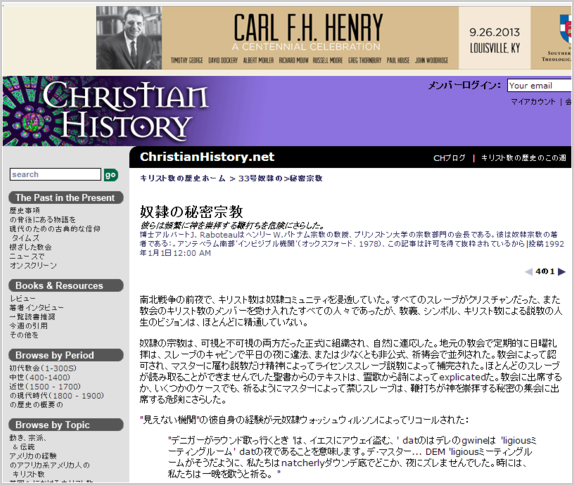
奴隷の秘密宗教
彼らは頻繁に神を崇拝する鞭打ちを危険にさらした。
博士アルバートJ. RaboteauはヘンリーW.パトナム宗教の教授、プリンストン大学の宗教部門の会長である。ベラム南部の '見えない機関'(オックスフォード、1978)、この記事は許可を得て抜粋されているから:彼は奴隷宗教の著者である。 |投稿1992年1月1日12:00 AM
They often risked floggings to worship God.
Dr. Albert J. Raboteau is Henry W. Putnam Professor of Religion and chairman of the religion department at Princeton University. He is author of Slave Religion: The ‘Invisible Institution' in the Antebellum South (Oxford, 1978), from which this article is excerpted by permission. | posted 1/01/1992 12:00AM
南北戦争の前夜で、キリスト教は奴隷コミュニティを浸透していた。すべてのスレーブがクリスチャンだった、また教会のキリスト教のメンバーを受け入れたすべての人々であったが、教義、シンボル、キリスト教による説教の人生のビジョンは、ほとんどに精通していない。
By the eve of the Civil War, Christianity had pervaded the slave community. Not all slaves were Christian, nor were all those who accepted Christianity members of a church, but the doctrines, symbols, and vision of life preached by Christianity were familiar to most.
奴隷の宗教は、可視と不可視の両方だった正式に組織され、自然に適応した。地元の教会で定期的な日曜日の礼拝は、スレーブのキャビンで平日の夜に違法、または少なくとも非公式、祈祷会で並列された。教会によって認可され、マスターに雇わ説教だけ精神によってライセンススレーブ説教によって補完された。
The religion of the slaves was both visible and invisible, formally organized and spontaneously adapted. Regular Sunday worship in the local church was paralleled by illicit, or at least informal, prayer meetings on weeknights in the slave cabins. Preachers licensed by the church and hired by the master were supplemented by slave preachers licensed only by the spirit.
ほとんどのスレーブが読み取ることができませんでした聖書からのテキストは、霊歌から詩によってexplicatedた。教会に出席するか、いくつかのケースでも、祈るようにマスターによって禁じスレーブは、鞭打ちが神を崇拝する秘密の集会に出席する危険にさらした。
Texts from the Bible, which most slaves could not read, were explicated by verses from the spirituals. Slaves forbidden by masters to attend church or, in some cases, even to pray, risked floggings to attend secret gatherings to worship God.
"見えない機関"の彼自身の経験が元奴隷ウォッシュウィルソンによってリコールされた:
His own experience of the “invisible institution” was recalled by former slave Wash Wilson:
"デニガーがラウンド歌っ行くとき 'は、イエスにアウェイ盗む、' datのはデレのgwineは 'ligiousミーティングルーム' datの夜であることを意味します。デ·マスター... DEM 'ligiousミーティングルームがそうだように、私たちはnatcherlyダウンデ底でどこか、夜にズレませんでした。時には、私たちは一晩を歌うと祈る。 "
修士Preachin '、リアルPreachin'
“When de niggers go round singin’ ‘Steal Away to Jesus,’ dat mean dere gwine be a ’ligious meetin’ dat night. De masters … didn’t like dem ’ligious meetin’s so us natcherly slips off at night, down in de bottoms or somewhere. Sometimes us sing and pray all night.”
Master’s Preachin’, Real Preachin’
スレーブは頻繁に彼らの主人の説教説教損なわ福音のために嫌悪のうち、独自の宗教的な会合を開催するために移動されました。 ': "説教が来て...彼はただ、言うと思い説教'あなたの主人に仕えるルクレティアアレクサンダーは、彼らが白の人々の疲れ成長したときに奴隷が何をしたか説明した。
Slaves frequently were moved to hold their own religious meetings out of disgust for the vitiated gospel preached by their masters’ preachers. Lucretia Alexander explained what slaves did when they grew tired of the white folks’ preacher: “The preacher came and … he’d just say, ‘Serve your masters.
あなたのマスターの七面鳥を盗むしないでください。あなたのマスターの鶏を盗むしないでください。あなたの修士hawgsを盗むしないでください。ご主人の肉を盗むしないでください。 whatsomeverあなたのマスターが行うことを説明してください。 '同じ古い事は、すべての時間....時には彼らは...本当のミーティングルームたい'いくつかの本当のpreachin 'とを....彼らはささやくような声で彼らの曲を歌うと、ささやくような声で祈っていました。 "
Don’t steal your master’s turkey. Don’t steal your master’s chickens. Don’t steal your master’s hawgs. Don’t steal your master’s meat. Do whatsomever your master tells you to do.’ Same old thing all the time.… Sometimes they would … want a real meetin’ with some real preachin’.… They used to sing their songs in a whisper and pray in a whisper.”
秘密の祈祷会に出席して捕まえた場合スレーブは厳しい処罰に直面していました。モーセグランディは、彼の義理の兄弟アイザック、スレーブの説教は、 "打たれ、彼の背中漬け"森の中の秘密のサービスで説教のために報告している。彼のリスナーはむち打ちと "があった他の誰に伝えるために余儀なくされた。"された
Slaves faced severe punishment if caught attending secret prayer meetings. Moses Grandy reported that his brother-in-law Isaac, a slave preacher, “was flogged, and his back pickled” for preaching at a clandestine service in the woods. His listeners were flogged and “forced to tell who else was there.”
スレーブは、その会議の検出を回避するためにいくつかの技術を考案した。一つの練習は人里離れた場所 - 森、峡谷、峡谷、そして雑木林(適切に "口止め港"と呼ばれる)での出会いを求めていた。カルバンウッズ "は、小さな部屋の形で"ハングアップし、 "空気を貫通するから彼らの声の音を保つために、"他のスレーブに説教し、徹底的に湿らされていたキルトやぼろ、後ろに身を寄せ合っている間歌と祈り覚えてまたは幕屋。
Slaves devised several techniques to avoid detection of their meetings. One practice was to meet in secluded places—woods, gullies, ravines, and thickets (aptly called “hush harbors”). Kalvin Woods remembered preaching to other slaves and singing and praying while huddled behind quilts and rags, which had been thoroughly wetted “to keep the sound of their voices from penetrating the air” and then hung up “in the form of a little room,” or tabernacle.
1ルイジアナのプランテーションでは、ときに "奴隷は夜に森の中に離れて盗むとサービスを保持するだろう"と彼らは "また、彼の膝の上であろうスピーカーのまわりで膝の上に円を形成するであろう。彼は前方に曲げると音を紛らすために水の容器に以上話すと思います。誰もがアニメーションになったと叫んだ場合は、他の人はすぐに加害者の口に手を置くことによって、ノイズを停止します。 "
On one Louisiana plantation, when “the slaves would steal away into the woods at night and hold services,” they “would form a circle on their knees around the speaker who would also be on his knees. He would bend forward and speak into or over a vessel of water to drown the sound. If anyone became animated and cried out, the others would quickly stop the noise by placing their hands over the offender’s mouth.”
彼は1847年に解放されるまで秘密の祈祷会の説明は、プリンスジョージ郡、バージニア州で奴隷であったピーター·ランドルフ、によって記録された:過去週の間に試験の他人を思い出させるために除いて "奴隷は、すべての彼の苦しみを忘れた、叫んだ: '神に感謝し、私はいつもここに住んではならない! "その後、彼らは握手をし、お互いに別れを入札し、1から別のものに渡す....彼らは独立したように、彼らは賞賛の別れの賛美歌を歌う"。
A description of a secret prayer meeting was recorded by Peter Randolph, who was a slave in Prince George County, Virginia, until he was freed in 1847: “The slave forgets all his sufferings, except to remind others of the trials during the past week, exclaiming: ‘Thank God, I shall not live here always!’ Then they pass from one to another, shaking hands, and bidding each other farewell.… As they separate, they sing a parting hymn of praise.”
http://www.christianitytoday.com/ch/1992/issue33/3342.html
宗教と奴隷 / Religion and Slavery
Except for the Society of Friends, all religious groups in America supported slavery. In the South black people were not usually allowed to attend church services. Those churches that did accept them would segregate them from white worshipers.
One of the main reasons why masters did not want their slaves to become Christians involved the Bible. They feared that slaves might interpret the teachings of Jesus Christ as being in favour of equality. This was one of the main reasons why most plantation owners did what they could to stop their slaves from learning to read.
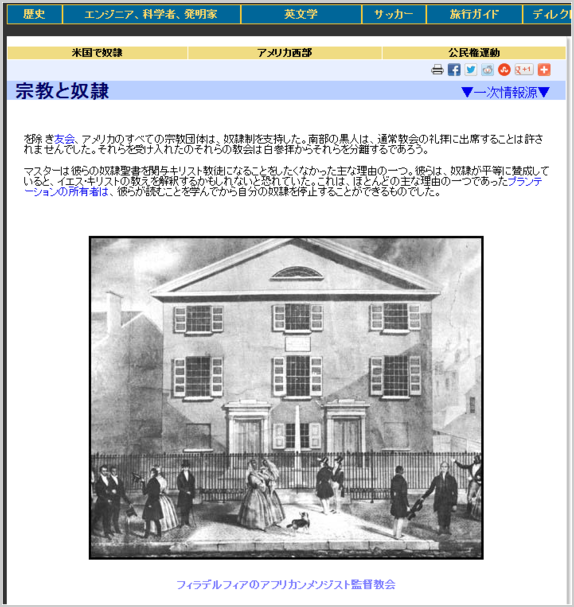
http://www.spartacus.schoolnet.co.uk/USASreligion.htm
ベラム南部奴隷制と宗教
Slavery and Religion in the Antebellum South
For many decades, scholars have debated the importance of religion in helping slaves cope with the horrible experience of slavery in the antebellum South.
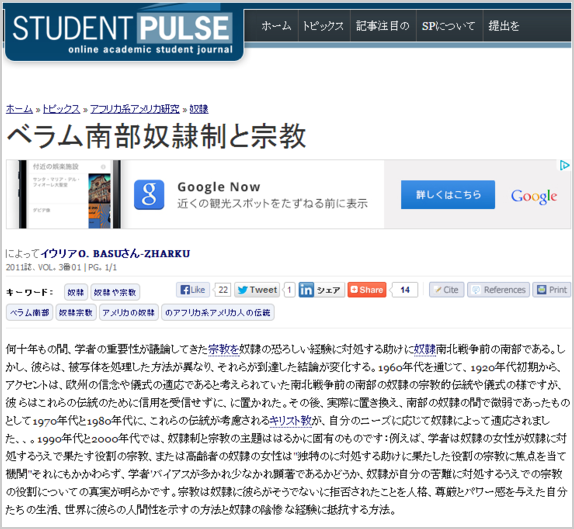
http://www.studentpulse.com/articles/372/slavery-and-religion-in-the-antebellum-south
魔女の中に住んでいるエンティティ
The practice of harnessing supernatural forces and spirits for one’s own personal use, known in some parts of Africa as ‘Obeye’ (an entity that lives within witches), has taken on many names in the Caribbean islands, such as Shango (Trinidad), Santeria (Cuba), Vodun or Voodoo (Haiti), Ju-Ju (Bahamas), Obeah (Jamaica),. Although African slaves usually practiced Obeah for "evil" or rather self-interested, instrumental purposes, this faith also aided them as a source of strength and clandestine resistance. The practice of Obeah is the belief that one can use certain spirits or supernatural agents to work harm to the living, or to call them off from such mischief. Generally, the British used the term Obeah to describe all slave acts and practices that were considered supernatural or evil in nature, such as rituals and fetishes.
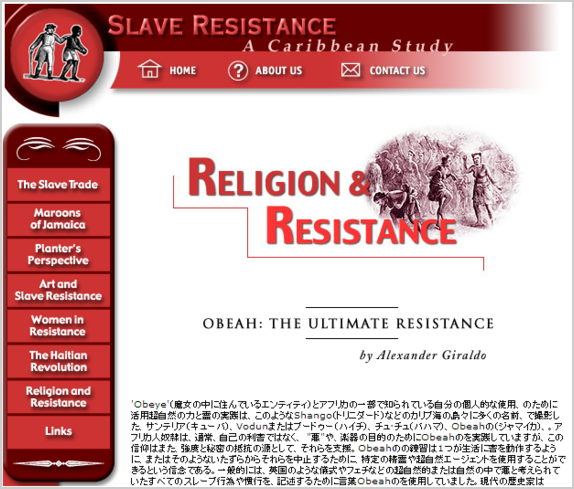
'Obeye'(魔女の中に住んでいるエンティティ)とアフリカの一部で知られている自分の個人的な使用、のために活用超自然の力と霊の実践は、このようなShango(トリニダード)などのカリブ海の島々に多くの名前、で撮影した、サンテリア(キューバ)、Vodunまたはブードゥー(ハイチ)、チュ·チュ(バハマ)、Obeahの(ジャマイカ)、。
アフリカ人奴隷は、通常、自己の利害ではなく、 "悪"や、楽器の目的のためにObeahのを実践していますが、この信仰はまた、強度と秘密の抵抗の源として、それらを支援。Obeahのの練習は1つが生活に害を動作するように、またはそのようないたずらからそれらを中止するために、特定の精霊や超自然エージェントを使用することができるという信念である。
一般的には、英国のような儀式やフェチなどの超自然的または自然の中で悪と考えられていたすべてのスレーブ行為や慣行を、記述するために言葉Obeahのを使用していました。現代の歴史家はObeahのは、ゴールドコーストにアフリカのアシャンティとKoromantin部族に由来すると考え、インポートされた奴隷は、17世紀中頃には早くもカリブ海にそれを導入している。
かかわらず、その使用、 '悪'または'良い'の、Obeahの男性が彼に会った人全員が最大限の敬意と恐怖で処理した。Obeahの男性と女性は、奴隷貿易の先頭からカリブ海スレーブ社会における重要な役割を果たした。彼らは、地域社会のリーダーとアフリカの民族の文化遺産の教師として機能した。多くのアフリカ人がObeahの男性が彼の力の中で、無敵の誰かをレンダリング死者を蘇生、すべての病気を治す、彼の犯罪の結果から人を保護し、彼が望んで誰にも大きな害を引き起こす能力を持っていたことを信じていた。
http://scholar.library.miami.edu/slaves/Religion/religion.html
宗教は奴隷制を促進するために使用されたか
How religion has been used to promote slavery
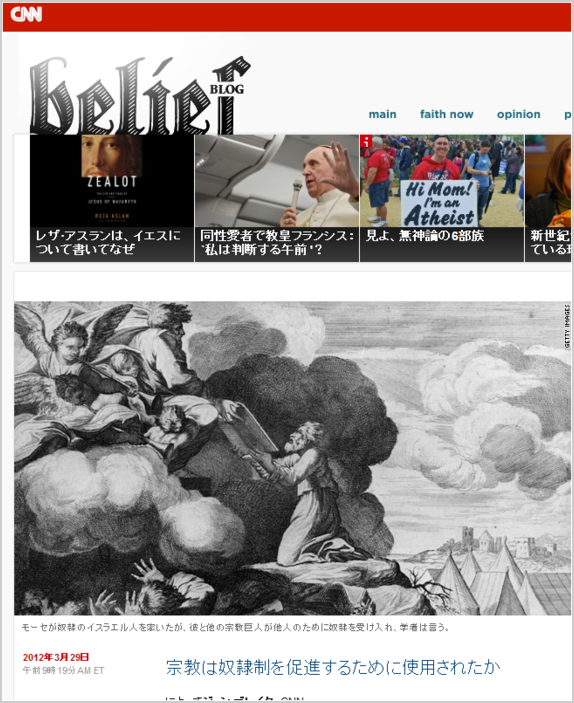
しかしユダヤ人、キリスト教徒とイスラム教徒が日常的に人間の奴隷を正当化するために、その創設者の言動を引用し、時間があった、学者は言う。
Yet there was a time when Jews, Christians and Muslims routinely cited the words and deeds of their founders to justify human bondage, scholars say.
http://religion.blogs.cnn.com/2012/03/29/how-religion-has-been-used-to-promote-slavery/
大西洋奴隷貿易と廃止
Atlantic slave trade and abolition
聖書と奴隷制 / The Bible and slavery
Author Richard Reddie writes about the Atlantic slave trade, how the Bible was used by Christians on both sides of the issue and the abolitionists who sought to bring it to an end.
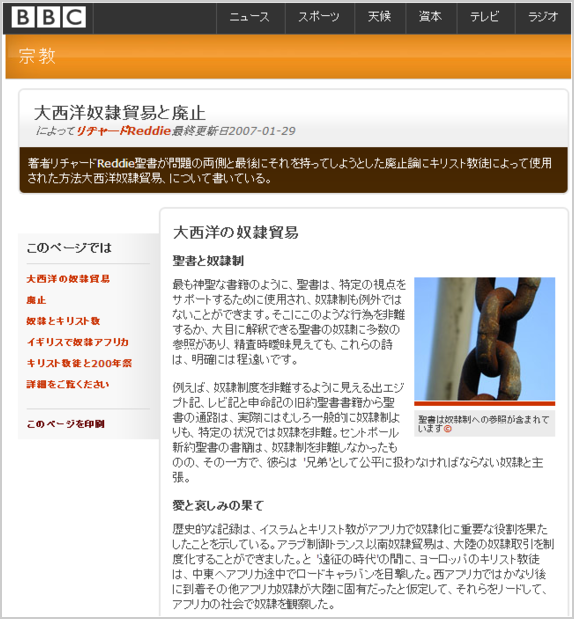
http://www.bbc.co.uk/religion/religions/christianity/history/slavery_1.shtml
スレーブ宗教 / Slave Religion
Enslaved Africans developed their own independent culture in the New World, drawing on both African and American traditions.
During the Great Awakening of the 18th century, many slaves converted to Christianity, particularly to the Methodist and Baptist denominations.
As slaveholders sought to control and restrict slaves' worship, enslaved communities developed "invisible churches" - ways of meeting in secret to worship as they chose.
Slave marriages were illegal in southern states, and slave couples were frequently separated by slaveowners through sale.
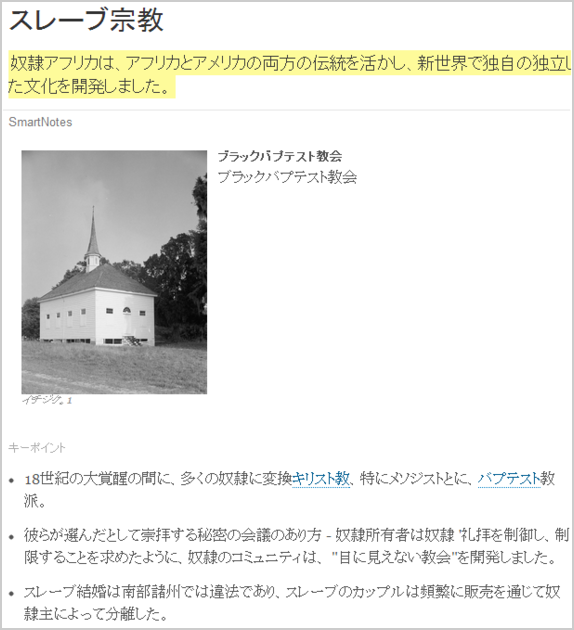
https://www.boundless.com/u-s-history/slavery-and-reform-1820-1840/slave-culture/slave-religion/
黒人奴隷と宗教 / Black Slaves and Religion
Black Slaves and Religion One of the first things that attracted the African American slaves to Christianity was a way of obtaining the salvation of theirs souls based on the Christian's idea of a future reward in heaven or punishment in hell, which did not exist in their primary religion.
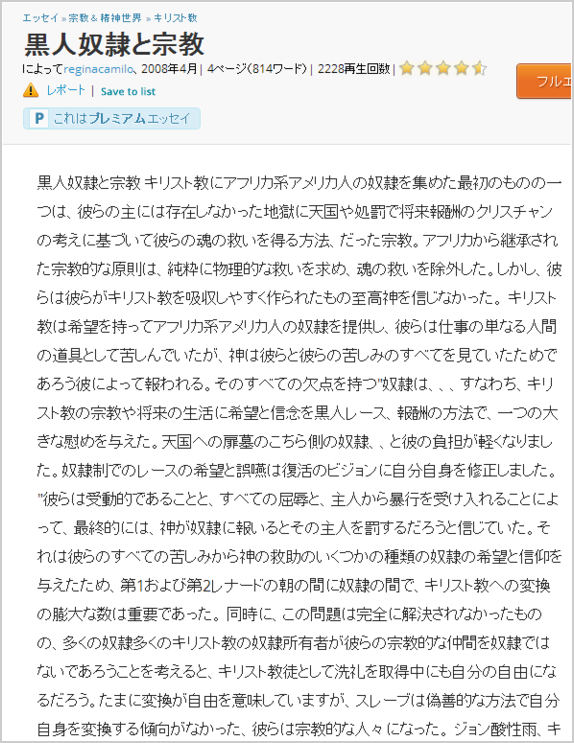
http://www.studymode.com/essays/Black-Slaves-Religion-145828.html